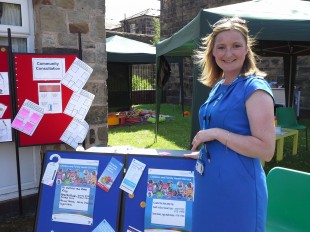 Just over 2 years ago I ‘virtually’ met a very determined mental health nurse via twitter, during various tweets @paul_RMHN raised the issue of the challenges that military children face. And on many occasions he posed the key question – how can we improve support for the children of those who serve our country? If I’m honest it wasn’t an area we had identified as part of the School Nurse Development programme – my Dad served in the Royal Navy, his brothers and my mother’s brothers all served in the forces and indeed both my grandfathers – even so I hadn’t thought about the health and wellbeing of military families. My colleague Pauline Watts and I pondered, then decided to seek views from our respective networks, we were not prepared for over 250 responses – all advising it was an area that needed to be looked at and all 250 wanted to be a part of a task group!
Just over 2 years ago I ‘virtually’ met a very determined mental health nurse via twitter, during various tweets @paul_RMHN raised the issue of the challenges that military children face. And on many occasions he posed the key question – how can we improve support for the children of those who serve our country? If I’m honest it wasn’t an area we had identified as part of the School Nurse Development programme – my Dad served in the Royal Navy, his brothers and my mother’s brothers all served in the forces and indeed both my grandfathers – even so I hadn’t thought about the health and wellbeing of military families. My colleague Pauline Watts and I pondered, then decided to seek views from our respective networks, we were not prepared for over 250 responses – all advising it was an area that needed to be looked at and all 250 wanted to be a part of a task group!
We discovered there is currently no single definitive record of the number of ‘Service children’ however, in 2010 the Pupil Level Annual School Census (PLASC) identified 37,940 Service children in England (DfE), and the Ministry of Defence Service personnel records indicated that there were 90,450 dependents aged 18 and under of military personnel in the Service population, in UK and overseas.
Children of military or service families are exposed to unique experiences, which may include; separation from a parent, frequent moving of house, caring for a sibling or parent, taking responsibility for the household or sudden deployment from a combat zone – all of which may impact on the way children lead their lives both now and in the future. The challenges each child or Service family face are different, however Service children who face regular moves from home and school can suffer high levels of anxiety and stress, also their health and their ability to learn may be disrupted especially when their parents are deployed to armed conflicts overseas. In addition, children with additional or complex health needs may find continuality of care a problem due to regular moves and may feel isolated or find it difficult to cope without the support from the extended family or local community networks
Identifying children of military families is often difficult, schools and health professionals may not even be aware of service children or indeed their movements. Without a doubt this can make accessing services or even providing continuity or support for children from service families difficult as they move between schools and wider services including health.
The armed forces covenant (2011) https://www.gov.uk/government/policies/fulfilling-the-commitments-of-the-armed-forces-covenant/supporting-pages/armed-forces-covenant emphasises that the whole nation, has a moral obligation to members of the armed forces and their families, and how they should expect to be treated. For most of the armed forces community, the covenant is about removing disadvantage to ensure armed forces and their families get the same outcome as the civilian community.
Health professionals such as health visitors and school nurses have a crucial role in identifying children of military families and can work with parents to improve the health outcomes – particularly in terms of emotional health and wellbeing. Both professional groups are well placed within local communities to support both serving personnel and indeed those families being re-based or returning to the UK. Health visitors and school nurses can support military families who may be struggling with separation anxiety and fears about a family member being killed, as well as the effects of post-traumatic stress disorder on their family after they return.
Over the last year, my colleague Pauline Watts and I have been working with key stakeholders including colleagues from SSAFA, British Forces Germany, Army Families Federation and Naval Families Federation, and professionals drawn from health visiting and school nursing teams from across England.
As part of the work we have been very fortunate to meet so many health visitors and school nurses who are interested in this area of work – usually because they have a link with the military – past or present. I was very fortunate to be invited to meet with Kerry Riley (Health Visitor) and Jayne Thompson (school nurse), who have been with partners locally to improve support locally.
Kerry joined our task group, together with 30 or more passionate individuals including @paul_RMHN , we are sharing good practice and developing networks to improve identification and support for children of military families– based on what works locally and overseas. Maybe as the work develops we will be able to answer the question @paul_RMHN regularly posed to me!
We will be hosting a conference on 3rd March 2015 to share the good practice, if you are interested in attending the conference on 3rd March please contact fiona.hill@dh.gsi.gov.uk
Wendy Nicholson is the Professional Officer for School and Community Nursing at the Department of Health

